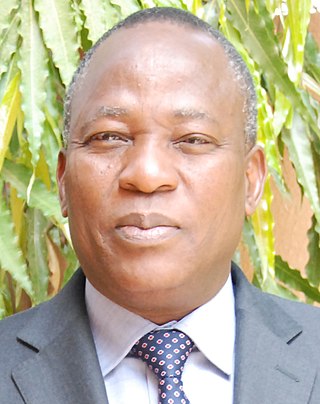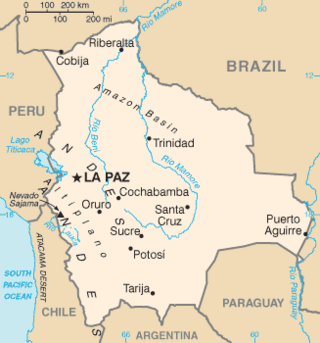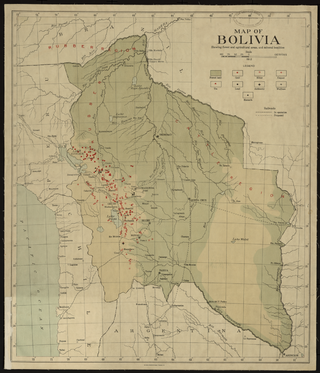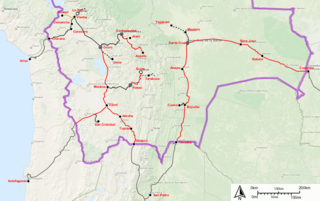Related Research Articles

Bolivia, officially the Plurinational State of Bolivia, is a landlocked country located in central South America. It is bordered by Brazil to the north and east, Paraguay to the southeast, Argentina to the south, Chile to the southwest, and Peru to the west. The seat of government and administrative capital is La Paz, which contains the executive, legislative, and electoral branches of government, while the constitutional capital is Sucre, the seat of the judiciary. The largest city and principal industrial center is Santa Cruz de la Sierra, located on the Llanos Orientales, a mostly flat region in the east of the country with a diverse non-Andean culture.

Paramanga Ernest Yonli also known as Ernest Paramanga Yonli, is a Burkinabé politician. He was Prime Minister from 6 November 2000 to 3 June 2007 and then President of the Economic and Social Council of Burkina Faso until March 2015.

Eduardo Abaroa Hidalgo was Bolivia's foremost hero of the War of the Pacific (1879–1883), which pitted Chile against Bolivia and Peru. He was one of the leaders of the civilian resistance to the Chilean invasion at the Battle of Topáter.
Abaroa or Avaroa may refer to:
Robert Klitgaard is an American academic, former president of Claremont Graduate University and former dean of the Frederick S. Pardee RAND Graduate School, where he was also the Ford Distinguished Professor of International Development and Security. He currently serves as university professor at Claremont Graduate University.
Daniel Kaufmann is the president emeritus of the Natural Resource Governance Institute (NRGI), which resulted from the merger of the Revenue Watch Institute – Natural Resource Charter. He is also a nonresident senior fellow at the Brookings Institution, where he was previously a senior fellow, and until July 2019 served in the international board of the Extractive Industries Transparency Initiative and in a number of advisory boards on governance, anti-corruption and natural resources and has also been in high-level expert commissions such as at the Organisation for Economic Co-operation and Development, the Inter-American Development Bank and the Mo Ibrahim Foundation. Prior to that, he was a director at the World Bank Institute, leading work on governance and anti-corruption. He was also a senior manager and lead economist at the World Bank, writing and working on many countries around the world, and was a visiting scholar at Harvard University. He has also served in other boards and councils in the past, including at the World Economic Forum.
Bolivia’s government considers irrigated agriculture as a major contributor to "better quality of life, rural and national development." After a period of social unrest caused by the privatization of water supply in Cochabamba and La Paz, the government of Evo Morales is undertaking a major institutional reform in the water resources management and particularly in the irrigation sector, aimed at: (i) including indigenous and rural communities in decision making, (ii) integrating technical and traditional knowledge on water resources management and irrigation, (iii) granting and registering water rights, (iv) increasing efficiency of irrigation infrastructure, (v) enhancing water quality, and (v) promoting necessary investment and financial sustainability in the sector. Bolivia is the first country in Latin America with a ministry dedicated exclusively to integrated water resources management: the Water Ministry.

Bolivia has traditionally undertaken different water resources management approaches aimed at alleviating political and institutional instability in the water sector. The so-called water wars of 2000 and 2006 in Cochabamba and El Alto, respectively, added social unrest and conflict into the difficulties of managing water resources in Bolivia. Evo Morales’ administration is currently developing an institutional and legal framework aimed at increasing participation, especially for rural and indigenous communities, and separating the sector from previous privatization policies. In 2009, the new Environment and Water Resources Ministry was created absorbing the responsibilities previously under the Water Ministry. The Bolivian Government is in the process of creating a new Water Law – the current Water Law was created in 1906 – and increasing much needed investment on hydraulic infrastructure.
Civil service reform is a deliberate action to improve the efficiency, effectiveness, professionalism, representativity and democratic character of a civil service, with a view to promoting better delivery of public goods and services, with increased accountability. Such actions can include data gathering and analysis, organizational restructuring, improving human resource management and training, enhancing pay and benefits while assuring sustainability under overall fiscal constraints, and strengthening measures for performance management, public participation, transparency, and combating corruption.

The Cochabamba Water War, also known as the Bolivian Water War, was a series of protests that took place in Cochabamba, Bolivia's fourth largest city, between December 1999 and April 2000 in response to the privatization of the city's municipal water supply company SEMAPA. The wave of demonstrations and police violence was described as a public uprising against water prices.

CAF - Development Bank of Latin America and the Caribbean, formerly the Andean Development Corporation, is a Caracas based development bank whose mission is to promote sustainable development and regional integration in Latin America and the Caribbean, through the financing of projects of the public and private sectors, the provision of technical cooperation and other specialized services.

Mining in Bolivia has been a dominant feature of the Bolivian economy as well as Bolivian politics since 1557. Colonial era silver mining in Bolivia, particularly in Potosí, played a critical role in the Spanish Empire and the global economy. Tin mining supplanted silver by the twentieth century and the central element of Bolivian mining, and wealthy tin barons played an important role in national politics until they were marginalized by the industry's nationalization into the Bolivian Mining Corporation that followed the 1952 revolution. Bolivian miners played a critical part to the country's organized labor movement from the 1940s to the 1980s.
The Harvard Institute for International Development (HIID) was a think-tank dedicated to helping nations join the global economy, operating between 1974 and 2000. It was a center within Harvard University, United States.

Amara M. Konneh is a Liberian national who serves as a Senator from Gbarpolu County, Western Liberia. Previously, he served as a senior advisor for Africa for the World Bank. In this role, he advised the World Bank on regional economic integration to create economic hubs for value chains and helped build strategic partnerships with Africa's regional economic commissions. Before that, he served as lead advisor for the Bank's engagements in countries affected by fragility, conflict, violence, and forced displacement with emphasis on Ethiopia, Eritrea, Kenya, and Nigeria.

Indigenous peoples in Bolivia, or Native Bolivians, are Bolivian people who are of indigenous ancestry. They constitute anywhere from 20 to 60% of Bolivia's population of 11,306,341, depending on different estimates, and depending notably on the choice Mestizo being available as an answer in a given census, in which case the majority of the population identify as mestizo, and they belong to 36 recognized ethnic groups. Aymara and Quechua are the largest groups. The geography of Bolivia includes the Andes, the Gran Chaco, and the Amazon Rainforest.
Jean-Paul Faguet is professor of the political economy of development at the London School of Economics and Political Science (LSE) and author or editor of six books and many academic and news articles, including Is Decentralization Good for Development? Perspectives from Academics and Policy Makers, and Decentralization and Popular Democracy: Governance from Below in Bolivia, which won the Political Science Association’s W.J.M. Mackenzie award for best political science book of 2012. He has advised the governments of numerous developing countries, as well as the World Bank, Inter-American Development Bank and the United Nations on local government reforms, poverty alleviation programs, decentralization, and the design of social investment funds. He is ranked amongst the global top 0.5% of social scientists according to the Social Science Research Network, and the global 1% of economics authors according to RePEc .

Corruption in Bolivia is a major problem that has been called an accepted part of life in the country. It can be found at all levels of Bolivian society. Citizens of the country perceive the judiciary, police and public administration generally as the country's most corrupt. Corruption is also widespread among officials who are supposed to control the illegal drug trade and among those working in and with extractive industries.

The history of rail transport in Bolivia began in the 1870s after almost three decades of failed efforts to build railroads to integrate the country, mining was the driving force for the construction of railways. The need to transport saltpeter to the coast triggered the first railway lines in Bolivia. It was the silver mining, however, that drove the construction of a railway from the Pacific coast to the high plateau during the nineteenth century. Later, at the beginning of the twentieth century, tin mining gave a new impetus to railway building, forming what is now known as the Andean or Western network. The eastern network, on the other hand, developed between the years 1940 and 1960 and is financed in exchange for oil through agreements with Argentina and Brazil. Bolivia being a landlocked country, the railways played a fundamental role and the history of its railroads is the history of the country's efforts to reach first ports on the Pacific coast and then the Atlantic.
Mzukisi Qobo is Head of Wits School of Governance at the University of the Witwatersrand in South Africa. He is also a political economist and associate professor of Strategy and International Business at the Wits Business School. In 2019, Mzukisi Qobo was appointed by President Cyril Ramaphosa to serve on the Economic Advisory Council. In the past, he has held a senior leadership role in government as chief director responsible for developing South Africa's trade policy at the Department of Trade and Industry.

The Ministry of Economy and Public Finance is a cabinet ministry of the government of Bolivia responsible for overseeing the nation's public finances and responsible for formulating and implementing macroeconomic policies that preserve stability and promote economic and social equity.
References
- ↑ Profile of Ronald MacLean Abaroa
- ↑ "Index Ma-Mam".
- ↑ "canciller". Archived from the original on 2015-09-24.
- ↑ "Globalisation and the reform of the Bolivian state, 1985-2005" (PDF). CORE.